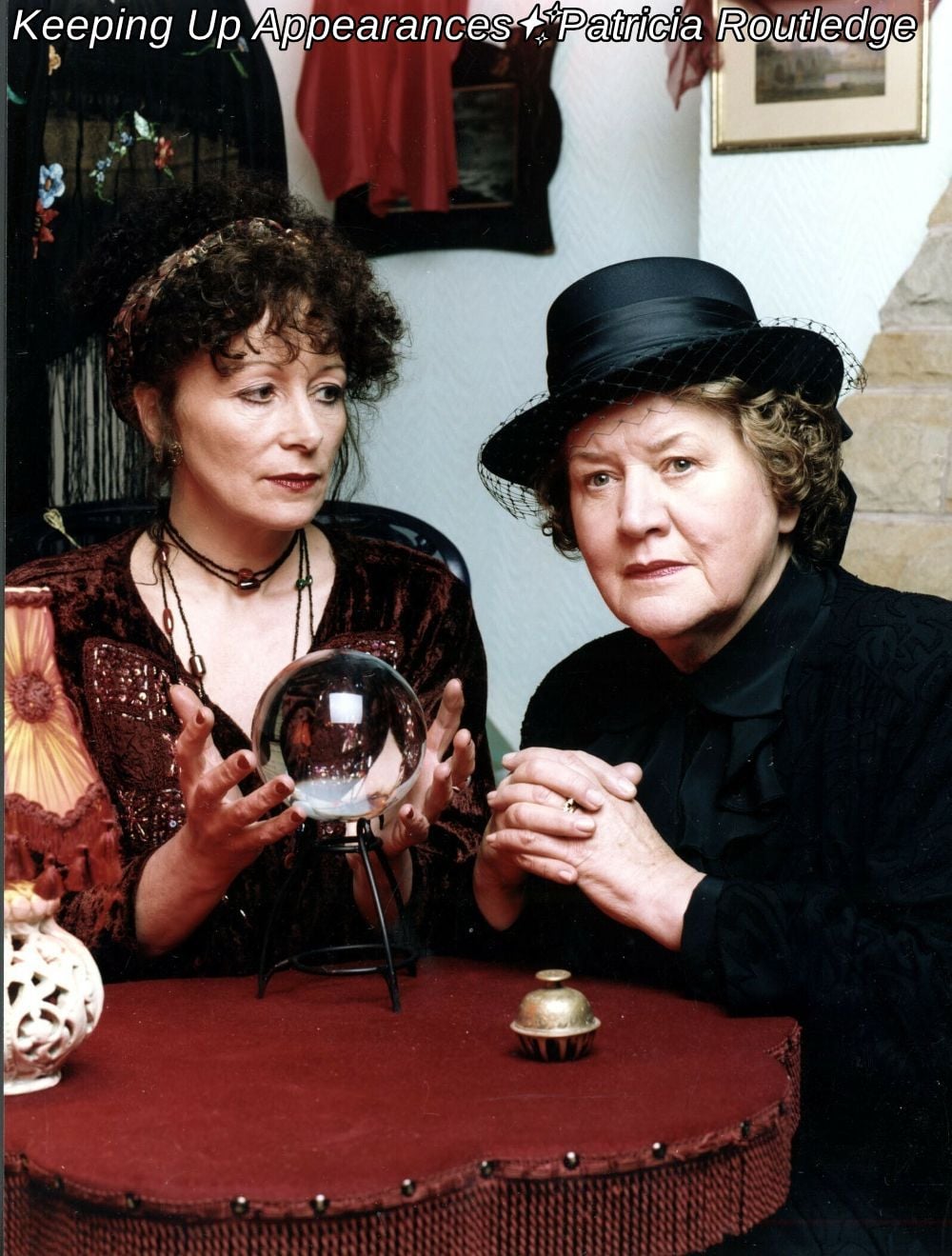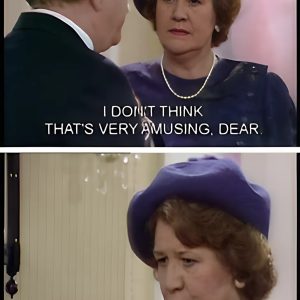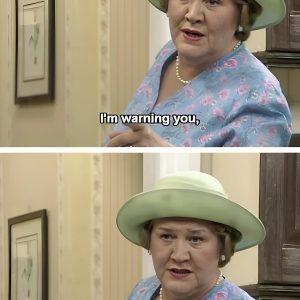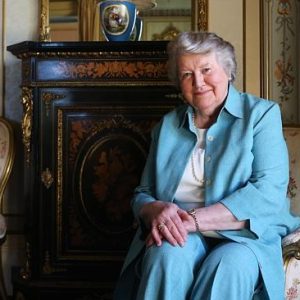Patricia Routledge’s Bold Leap from Pilot to Prime Time: The Untold Story Behind Hetty Wainthropp Inves
In 1990, on a quiet corner of ITV’s programming schedule, a single, unassuming television pilot aired. Titled Hetty Wainthropp: Missing Persons, it starred Patricia Routledge—not yet a dame, not yet a global icon of suburban satire—as a shrewd, sharp-witted woman who discovered a late-in-life calling as a sleuth for the overlooked and forgotten.
Though it would take six long years before the character was fully resurrected and immortalized in the BBC’s Hetty Wainthropp Investigates (1996–1998), that one-hour television experiment was enough to plant a seed. And it grew into one of Britain’s most quietly revolutionary detective dramas—a series that redefined the cozy mystery genre and offered Routledge one of her most layered, defiant roles.
A Detective Unlike Any Other
The Hetty Wainthropp pilot emerged during a time when British crime dramas were typically led by men—grizzled inspectors, hardened sergeants, and chain-smoking loners solving crimes with gruff intensity. But Hetty Wainthropp was different. She wasn’t a police officer or private investigator. She was a housewife—a 60-year-old woman armed with a handbag, a moral compass, and a stubborn refusal to let injustice slide by unnoticed.
Played with unwavering intelligence and humanity by Routledge, Hetty was a working-class matriarch from Lancashire who had seen enough of life to know when someone was being lied to or left behind. In Missing Persons, she takes on her first unofficial case: the disappearance of a local young woman whose absence has been brushed aside by authorities. Hetty sees something no one else does: the humanity of the missing, the pain of the ignored, and the importance of truth, no matter how small the mystery may seem.

Supporting Routledge in the pilot were screen veterans Jimmy Jewel, Jean Heywood, and Jean Kent—stalwarts of British television who helped bring emotional heft and realism to the tale. But it was Routledge’s performance that stood out, and rightly so. Beneath Hetty’s sensible shoes and floral-print coats was a mind as precise as Poirot’s and a heart as big as Marple’s—yet wholly distinct from either.
From Pilot to Passion Project
Despite the strength of the pilot, ITV didn’t move forward with a series. It was a rare misstep by the network, which had underestimated not only Routledge’s drawing power, but also the cultural moment. Women-led crime dramas were on the cusp of a renaissance, and audiences were ready for heroes who looked like them.
The delay in Hetty Wainthropp’s return didn’t deter Routledge. She would spend the next few years stealing scenes in Keeping Up Appearances as the immortal Hyacinth Bucket, gaining international fame for her comedic precision. But Hyacinth, with all her delusions of grandeur, was a character driven by aspiration. Hetty, in contrast, was grounded in resolve. And when the BBC came calling in 1996, Routledge didn’t hesitate.
Thus Hetty Wainthropp Investigates was born—a four-season series that ran until 1998 and left an indelible mark on British crime television. Produced by the BBC, the show reintroduced Hetty as a full-fledged private investigator with her own agency, a teenage assistant named Geoffrey (played by a then-unknown Dominic Monaghan), and a growing list of missing persons, mysterious deaths, and domestic injustices to untangle.
The Power of the Underdog
What made Hetty Wainthropp Investigates revolutionary was its refusal to rely on violence or cynicism. Instead, it focused on observation, empathy, and meticulous deduction. Hetty was never above offering a biscuit and a kind word before she asked a difficult question. The series tackled everything from elder neglect to financial scams, youth homelessness to corruption—all through Hetty’s lens as a woman who knew struggle, and therefore recognized it in others.
In many ways, Hetty Wainthropp became a tribute to the underestimated: older women, working-class families, small communities. She didn’t own a gun or drive a flashy car; she had a notepad, an intuition for truth, and an unshakable belief in right and wrong. Routledge infused the role with quiet power, turning Hetty into a symbol of justice as performed not by the elite or the powerful, but by ordinary people with extraordinary courage.
A Career Cemented in Complexity
For Patricia Routledge, Hetty marked a critical shift in a career that had already spanned Shakespearean roles, award-winning musical theatre, and transatlantic sitcom stardom. The actress, known for her command of language and her disdain for superficiality in modern acting, found in Hetty Wainthropp a character who demanded substance over style.
Critics lauded her portrayal as deeply authentic and emotionally rich. Audiences connected with the series on a deeply personal level. In an age where television often glamorized crime, Hetty Wainthropp Investigates humanized it—and Routledge’s performance anchored every episode with grace and gravitas.
“I only take on projects I can burn energy on,” Routledge once said. “And Hetty was worth every ounce.”
A Legacy Rekindled
Today, more than three decades after Missing Persons first aired, Routledge’s turn as Hetty continues to resonate. The series remains a favorite on streaming platforms, its timeless themes of justice and moral courage as relevant now as they were in the 1990s.
And perhaps most intriguingly, there is renewed interest in the original pilot. Long overshadowed by the full series, Hetty Wainthropp: Missing Persons is now regarded by fans and critics alike as a lost gem—a rare glimpse into the first spark of what would become one of Routledge’s most impactful roles.
With the recent surge in interest in classic British television and the ongoing recognition of Routledge’s contributions to dramatic arts, there is talk of remastering and re-releasing the original pilot for modern audiences. Whether that happens or not, the legacy of Hetty Wainthropp is secure.
She was the woman who defied expectations, investigated the forgotten, and reminded us all that age is no barrier to heroism. And Patricia Routledge—steely-eyed, velvet-voiced, ever dignified—was the perfect woman for the job.
Would you like a version formatted for publication or shared on a blog or fan site?





